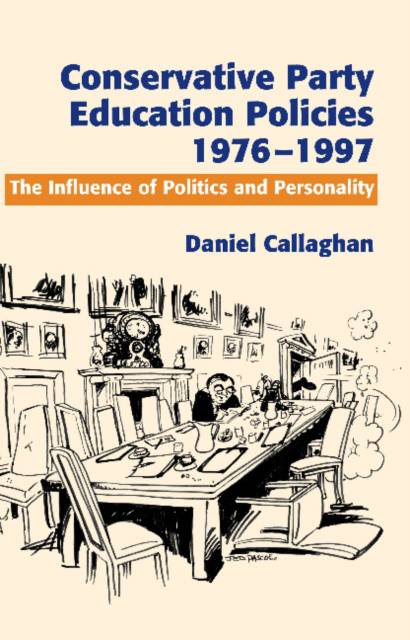
- Afhalen na 1 uur in een winkel met voorraad
- Gratis thuislevering in België vanaf € 30
- Ruim aanbod met 7 miljoen producten
- Afhalen na 1 uur in een winkel met voorraad
- Gratis thuislevering in België vanaf € 30
- Ruim aanbod met 7 miljoen producten
Zoeken
Conservative Party Education Policies, 1976-1979
The Influence of Politics and Personality
Daniel Callaghan
Hardcover | Engels
€ 41,95
+ 83 punten
Omschrijving
This book examines education policy making with close reference to interview evidence of protagonists and observers of the period, who include senior officials, ministers and ministerial special advisers. It introduces an original typology of regulars, irregulars and politicos, to classify those involved and examines the personal and political context in which they operated, how these contexts impacted on their decisions, and the subsequent course of education policies. The theme of the book is that people matter. Introducing personality' into our understanding and interpretation of the development of education policy, constitutes a significant original contribution. Too often individual policy-makers have been portrayed as caricature creatures of a 'role', or an 'interest'. The actions, or inter-actions, of individuals are viewed and analysed through the prism of policies or assumed ideological positions. The book explores the reverse relationship, where the course of policies is not studied through abstract generalities' but through the concrete experiences of individuals, the personal and political contingencies they faced. It was not that politics and personality were all that mattered between 1976 and 1997. Rather, the problem was that they mattered too much.
Specificaties
Betrokkenen
- Auteur(s):
- Uitgeverij:
Inhoud
- Aantal bladzijden:
- 234
- Taal:
- Engels
Eigenschappen
- Productcode (EAN):
- 9781845191207
- Verschijningsdatum:
- 26/10/2005
- Uitvoering:
- Hardcover
- Formaat:
- Genaaid
- Afmetingen:
- 229 mm x 152 mm
- Gewicht:
- 509 g

Alleen bij Standaard Boekhandel
+ 83 punten op je klantenkaart van Standaard Boekhandel
Beoordelingen
We publiceren alleen reviews die voldoen aan de voorwaarden voor reviews. Bekijk onze voorwaarden voor reviews.








